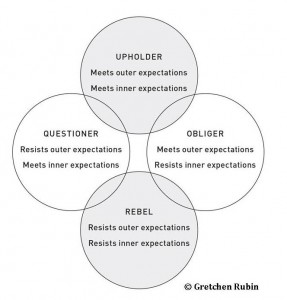
Flickr 4850589061_7545c4d438_z
Last month, I promised to address 2 frameworks for changing bad habits, and here is Part II based on Gretchen Rubin’s new bestseller, Better Than Before (2015). You may remember her previous book, The Happiness Project (2009). In Rubin’s second project, she tackles the topic of changing habits. She starts with the premise that you first must “Know yourself,” beginning with “We all must figure out what’s true about ourselves, and then use the strategies that will work for us.” I thank two colleagues, Robin and Colette, for pointing me in this direction.
Rubin starts by stating that she is not interested in the neuroscience reasons behind why people find it difficult to change engrained habits. Rather, she uses a more personality-type oriented approach, which she calls your “tendencies” or “Foundation.” The basic descriptions of the four types are below, and you will notice she first divides the categories on whether a person is outwardly or inwardly oriented to fulfilling expectations.

She provides an online test to see where you fall on her spectrum at www.bit.ly/HabitsQuiz to help you discover which category you fall into: an Upholder, a Questioner, an Obliger, or a Rebel.
Rubin then identifies 21 different strategies for changing habits. In an interview with the magazine Coaching World (17 February 2016) she states, “ Just because a habit worked for Benjamin Franklin or Taylor Swift doesn’t mean it will work for you. A good example of this? Morning people and night people. Sure, it makes sense on paper to exercise first thing in the morning. But if you’re a night person, you’re at your most energetic much later in the day.” So tailor your change plans to this personal tendency.
Later in that same interview, she adds: “Because there are so many strategies, each of us can choose the ones that appeal most to us. One person does better by starting small; someone else, by starting big. One person does better going public with his habit; someone else, by keeping her habit private. We all must figure out what’s true about ourselves, and then use the strategies that will work for us.
Three examples of the types of strategies she suggests in that interview (no, I’m not going to go through all 21) are:
- The Strategy of Accountability to hold themselves [accountable] to someone else for meeting certain targets or aims.
- [Using] the Strategy of Foundation to make sure that…self-command is high. It’s hard to make demands on yourself when you’re exhausted and hungry, and your desk is stacked high with paper!
- [Using] the Strategy of Pairing: “I can only shower on a day that I make 3 networking emails.” (Rubin, 2016.)
Stephen Guise suggests breaking in new habits by breaking them down into “stupid small” pieces. I agree. Do you want to write more? Start by writing 50 words per day. More up to a paragraph. Then to three. Then to a page. etc., etc. Do you want to read more? Start by reading two pages in a book a day. As Guise puts it, “your brain will fall for this bait.”
My own recommendation to start the process of changing habits would be to look around your workplace and think about what five specific things that to change your work life, no matter what environment you are in, to make your life better. For instance, what can you do to break up time you sit at a computer without getting up? Maybe set a timer.
What can you do about a constant flow of junk food? Find an alternative you can have on hand, like a power bar, carrots or an apple. What can you do about meetings that always run over the allowed time? Start making other plans that require you to leave at the allotted time. Drinking too much coffee? Maybe you can add tea or even soup bullion to the mix of available items.
What about escaping to computer games or Facebook for so long that you get to the end of the day without getting the necessary work done? Another great opportunity to use a timer!
A lot of writers and coaches recommend rewards for good habits, perhaps getting a break on health insurance costs if you stop smoking. But that may not be an internal change that will stick for you over time. Better if you are the one desiring the change and the reward for following through is something you truly want or enjoy. Small rewards work just fine: “If I finish one page of this report or article, I will walk around the block one time enjoying the wonderful spring weather.” It both gives you a break from the computer, allows your brain to rest, and helps your body function better. This is one of my personal favorites.
I believe it is best to “start where you are” and accept yourself as you are first. Let go of the idea of perfection, and know that when you seek to change your habits you may fail… not only the first time, but the second time, and the third time, and… it’s hard to say how many times you may have to restart the process. People who quit smoking know exactly how hard it is to change that habit. But if you value health and the possibility of staying on the planet a little longer with your family and friends, then it’s a little bit easier to stay the course.
For myself, I have always found it easier to change when I have some kind of external accountability. I bet you can guess where I fall on Gretchen Rubin’s personality tendencies. (If you guessed, based on her quiz, that I am an “Upholder,” you are correct.) So give yourself a break by accepting who you are right now, decide what you want to start changing bad habits, accept it may take a bit of time with some setbacks, start small and give it a shot. What have you got to lose? And the win is being both happier with yourself and happier with your life.
Tags: bad habits, change, changing, habits







Thank you, Hillary. This is exactly what I needed to read this morning. I started small by removing all bread and chips from the house.
So happy to hear it, Jenny! Always makes me happy when people find my postings useful.